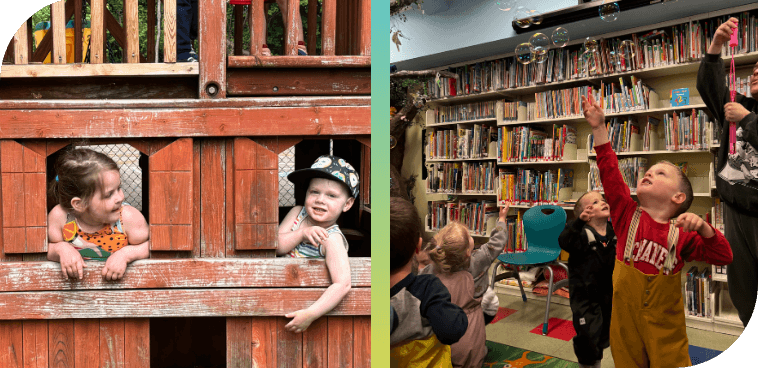Quality Care, Quality Jobs

Quality Care, Quality Jobs
Building a care economy that works for all
Investing in Care Services for People, their Families and their Communities
When we think about economic development, we often picture new businesses, new construction projects, or metrics like the Gross Domestic Product (GDP) or stock market performance. While these metrics are all appropriate, it is essential to remember that the primary purpose of economic development is to enhance the economic well-being and quality of life for individuals and their communities. A good example of this is the care economy.
In addition to providing needed social development support, the care economy acts as a powerful engine of economic growth and development. It encompasses everything from child care to elder care, supporting people at every stage of life.
Many businesses and social entrepreneurs are exploring how best to capitalize on this lifecycle of economic opportunity.
THE LITTLE RED PLAYHOUSE
The Untapped Potential of Child Care
Child care serves as a pillar of the care economy and a foundational building block of childhood development. Yet, for many parents, finding quality child care is a challenge.
When Sharon McCarry’s son was diagnosed with autism two decades ago, she faced a system that could not respond to her family’s needs. “I was kicked out of three different places, two community run programs and a daycare, within three weeks,” McCarry recalled. “Even with my privately paid for and trained aide, nobody wanted the responsibility. It was gut-wrenching; where was my child supposed to go?”
Frustrated by the lack of options, McCarry transformed the Little Red Playhouse in Montreal-West into a private, inclusive preschool centre where neurotypical and neurodiverse children learn alongside each other. Seventeen years later, her model has become a blueprint for what inclusive child care, which provides early rehabilitation alongside, can look like.


A closer examination of Quebec’s child-care system, particularly for children with special needs, reveals a disconnect between policy and reality.
As McCarry explained, “Quebec has 307,552 daycare spots, but only a tiny fraction accommodate high-needs kids. Some families can apply for the publicly funded allowance of $3,500 per year for a subsidized daycare to find an aide to assist a child’s support needs, but that equates to maybe two hours a week.”
Not only is that investment woefully insufficient, but the situation is made more difficult by the lack of standardized training for these aides.
Better child-care services hold the promise of innovative development in the care economy, even in a highly regulated setting. For example, qualified instructors can secure employment by teaching specialized skills to aides, who in turn improve their education and career prospects in providing special-needs children with higher-quality care
“If we identify and provide comprehensive support to kids before age seven,” McCarry emphasized, “they’re more likely to thrive in school and find employment later in life.”
A real win for all involved.
WALES HOME
Increasing demand shows growth
Brendalee Piironen is the Executive Director of the private, not-for-profit Résidence Wales Home and CHSLD Wales in Quebec’s Eastern Townships. It is one of the few English-language senior care facilities in the province of Quebec. Like her mother before her, Piironen was a caregiver at the Wales Home before she started her managerial journey.
Years ago, Piironen’s mom was diagnosed with emphysema and, due to lack of oxygen, she suffered from dementia. “I learned a lot from the experience of my mother’s illness, and I decided that I wanted to be an administrator to make a difference,” she explained.
Piironen has dedicated nearly her entire life to making the Wales Home an exemplary seniors’ residence, worthy of her own mother’s care.
With 15 awards to its credit, including the prestigious Plantree Gold Certification for excellence in Person-Centered Care, “the Wales Home is one of 80 gold-designated health-care facilities in world, and one of six in Canada. The CHSLD Wales is the only gold-designated long-term care facility in Quebec.”


“The aging population is going to explode very soon, and there won’t be enough services available,” said Piironen. For example, since 2007, the Wales Home has nearly doubled its workforce, growing from 125 to almost 200 employees. Now is not the time to slow down; as the number of seniors, including those requiring specialized care, continues to rise, so too does the nationwide shortage of available spaces.
Residences like the Wales Home provide all-inclusive care at every level. They are well-equipped and have significant beneficial impacts for individuals, the community, and the economy. In fact, residences can be very innovative. They can partner with schools and other care organizations to create both economic opportunities and richer community life. The Wales Home hopes to implement a future pilot project that will transform an unused house into an on-site daycare, where children of Wales Home staff members will interact with residents, blending practical support with meaningful connections.
To take full advantage of such opportunities, the Wales Home created the Wales Foundation in 1991. The foundation has raised over $30 million, enabling it to significantly improve the quality of life for both residents and employees.
As populations age, the demand for elder care services is expected to continue growing. Investing in home care, assisted living facilities, and other support services is essential to ensure that seniors can age with dignity and maintain their independence.
CONNEXIONS RESOURCE CENTRE
Support for Adults and Caregivers
In Gatineau, the Connexions Resource Centre addresses the challenges of mental health and senior care, serving as both a direct service provider and a central referral hub for quality care services.
“It’s about helping people find the services that they need and accompanying them during their search,” explained Danielle Lanyi, Executive Director at Connexions.


Acting as a hub allows Connexions to identify important service gaps. “One of the biggest gaps we see is in respite services for caregivers so that they can get a break.”
These service gaps highlight opportunities for economic development. “I think there are many opportunities for people to have small businesses doing respite,” Lanyi said.
For Lanyi, the lack of services is not so much about funding as it is about value and policy. “If you can’t hire people, it doesn’t matter how much money you have,” she said. “There needs to be more value created around providing that type of support. More value would lead to better remuneration and ongoing training.”
The heart of the matter for developing a sustainable care economy revolves around how we value and support care work and workers.
Investing in the Future
Growing the Care Economy
The care economy is an area of significant business and social entrepreneurship. High-quality care services, for everyone from children with special needs to seniors with disabilities, promote inclusion and the well-being of individuals and their communities.
The initiatives and investments described above illustrate innovative and inspiring approaches to building care services. They emphasize the dignity of individuals, the value of community, the critical role and importance of care workers, and the need to continuously improve their working conditions.
Successful business development and social entrepreneurship by public, private, and civil society sectors are key to continued growth and development in the care economy.
CEDEC is working with public, private, and civil society stakeholders to create a Roadmap of promising economic development opportunities to be pursued in 2026-2028. The identification of these opportunities stems from CEDEC’s report, Overview of Quebec’s Economic Landscape (OQEL), and a recent series of Collaborative Economic Development Dialogues (CEDDs), designed to discuss the findings of the report.
CEDEC’s research activities have identified promising economic development initiatives across various economic sectors. In a nine-part series, CEDEC is highlighting some of these initiatives and the leadership, determination, and innovation of their champions who successfully brought these businesses and social enterprises to life.
Stay in the loop!
Sign up to be notified of future articles published in CEDEC’s Collaborative Economic Development series.
